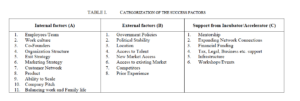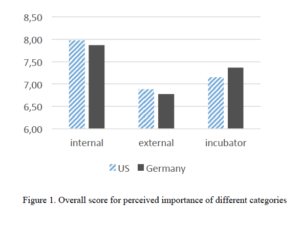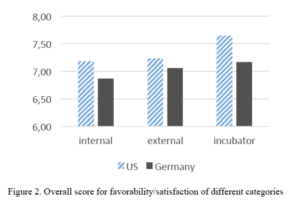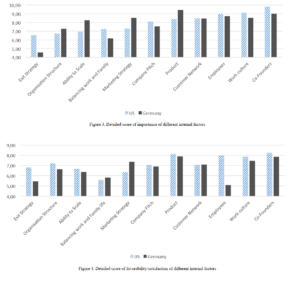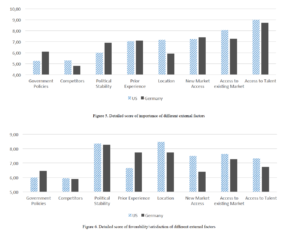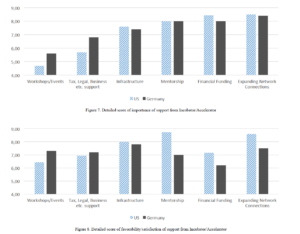Analysis of startup ecosystems in Germany and in the USA
Explorative comparison of the startup environments
Prof. Dr. Richard C. Geibel
University Fresenius of App. Sciences
Competence Center Entrepreneurship
Cologne, Germany
geibel@hs-fresenius.de
Meghana Manickam, M.Sc.
Department of Management Science and Engineering
Stanford University
Stanford, USA
meghanam@stanford.edu
Abstract— The startup ecosystems in Germany and in the US are different in several dimensions and they have a huge impact on the success of startups. In this study the factors that affects the startup ecosystems are compared. It is analyzed what startups consider as critical to their success and how this varies based on the location of the startups. Using the developed scoring mechanism, the study compares the relative scores of various success factors between the German and American startups to identify areas for improvement. The findings suggest that Germany is successful in implementing co-working spaces and incubators but it lacks on accelerator programs. Further, it needs to develop a better support system for their startups while the German startups themselves need to focus on building a stronger internal team in order to boost the startup ecosystem.
Keywords-success factors; internal factors; external factors; support from incubator/accelerator; American startups; German startups; scoring mechanism; startup ecosystem; areas for improvement; startup environment
I. INTRODUCTION
Entrepreneurship is a key factor that drives economic growth and innovation of a country and helps deliver new opportunities for all its citizens [1]. In order to compete in world markets, countries needs to have the capacity and wherewithal to support the high rates of establishment and dissolution of startups [2]. Currently the US ranks as the number one place which provides the most conducive environment for entrepreneurs while Germany lags behind [3].
A report issued by the Global Entrepreneurship Monitor indicates that the percentage of adults involved in startups in the US hit a record high of 13% in 2013 while it was just 5% in Germany [4]. Taking into account that a large percentage of startups fail, it becomes even more critical to ensure their success in countries like Germany to assure the positive development of the startup eco-system.
The success of a startup depends on a plethora of factors. Given the rapidly growing popularity and importance of entrepreneurship around the world and the high risks associated with it, it is imperative to understand what the critical factors are for the success of a startup. While existing literature focus on factors necessary for the success of a startup in the pre-launch phase, there is a necessity to examine further how these factors vary across different geographical locations and culture.
This study focuses on a comprehensive understanding of what the critical success factors are for startups in different locations, specifically in the US and Germany and identifies key areas that the startups and incubators/accelerators need to focus their resources on in order to be successful. However, it is important to remember that this study is subjective despite efforts to be as objective as possible. The study develops a set of hypothesis based on surveys and expert interviews.
II. CRITICAL SUCCESS FACTORS
Critical success factor is defined as those characteristics, conditions or variables that, when properly sustained, maintained, or managed, can have a significant impact on the success of a firm competing in a particular industry [5]. In order to determine what the critical success factors for startups are, we conducted an extensive literature review and developed a framework containing 25 important factors. These were analyzed to determine the top 3 critical success factors within each of the three categories which is explained further in the next section.
A. Categorization of the success factors
The 25 success factors were grouped into three categories as ‘Internal factors’, ‘External factors’ and ‘Support from incubator/accelerator’. Internal factors pertain to those variables that come from within the startup and over which the founders have a great degree of control. External factors pertain to the external forces which develop as a result of the environment in which the startup is placed and over which the founders have little or no control [6]. Finally, the last category refers to the factors which are specific to the incubator/accelerator, if any, that the startup is associated with.
This categorization allows for a clear understanding of what set of critical success factors play an important role in determining whether a startup is successful or not. It also allows for easy comparison between startups across different geographical locations and identifications of areas of improvement. The list of the various success factors considered for our research can be found in Table 1.
III. METHODOLOGY
In order to determine what the success factors for a startup were, this study was divided into two parts. The first part involved the identification and mapping of the various success factors into the three categories. The second part involved developing a scoring mechanism that would allow for easy comparison of the different success factors across different startups globally. Using this scoring mechanism, startups in the US and in Germany were asked to score the different success factors and also identify how favorable or how well each of the success factors was satisfied. The average scores of the success factors in the US and in Germany were then compared to identify areas of improvement. The scores by the startups in the US were used as a benchmark in order to determine how the startups in Germany were currently performing.
A. Scoring Mechanism
Each success factor in the three categories is scored on a scale of 1 to 10 with 1 being the least critical and 10 being the most critical. Further, each startup was also asked to score on a scale of 1 to 10 how well each factor was satisfied or was favorable to the startup, 1 being 0% satisfied/Very unfavorable and 10 being 100% satisfied/Extremely favorable.
The scores for each success factor in each of the three categories is then averaged individually for all the startups in the US to obtain a composite score for each success factor. The same is repeated for the startups in Germany. The top three critical success factors in each category were then further analyzed and used for developing recommendations.
Further, the composite scores of the different success factors within a category are averaged to give an overall score for each category for US and for Germany.
B. Selection of American startups
For the purpose of this study, we identified several successful startups from the US, which were a part of top incubators/accelerators such as Techstars and Y-Combinator [7]. Data was collected from 17 successful startups located in the Silicon Valley, New York, Boston, Texas and other upcoming startup locations. Data was collected primarily through online surveys among others, which represented different geographical locations, industries and size.
C. Selection of German startups
Similarly, successful startups in Germany were selected from the Cologne region due to its importance as an entrepreneurial hub alongside Berlin, London, Amsterdam and other cities in Europe [8] in view of its high GDP and rapidly developing startup eco-system for the first phase of the study. Further, its close proximity to our location made it possible to collect first-hand data through in-person interviews in addition to online surveys. As with the American startups, these startups in Cologne represented a diverse range of industries and size.
Currently, more data from startups is being collected for the second phase of the study.
IV. RESULTS
The data from the survey showed that both the US and German startups place almost equal importance on each of the three categories, with German startups placing a much higher importance on the role incubator/accelerator play in their success. However, the German startup ecosystem need to further focus on improving how well they are able to achieve ideal levels of satisfaction of different factors within each category, particularly when it comes to support from incubator/accelerator. See Fig. 1 and Fig. 2 for the scores.
The numbers by themselves mean nothing, it is the relative comparison of the scores that is of prime importance.
A. Internal factors
The detailed scores of the different internal factors (A) are shown in Fig. 3 and Fig. 4. From our research, it appears that the US startups place a high level of importance on the co-founders, work culture and employees while the German startups place an inordinate amount of importance on their product, marketing strategy and their ability to scale.
Although these factors are just as important, we hypothesize that the US startups are very people oriented and first focus on the team and build a strong core foundation before developing their other capabilities. The German startups, on the other hand focus more on the product/idea.
Co-founders
Most founders in the US feel strongly that it is important to have a co-founder with complimentary skill sets with whom they have worked with in the past and who share a common vision for the company in order to sustain the .
Employees
Finding the right people who share the company’s vision and passion and who bring the right set of talents plays an important role in ensuring the startup’s success. Clearly Germany has yet to develop its talent pool to include a more internationally diverse population. Further, venture capitalists consider a good team to be one of the most important factors while making an investment [9]. Hence, to secure the required funding to market their product, the German startups first need to focus on building a stronger team.
Work culture
The work culture sets the aims and aspirations for the current team and future hires. It has a direct impact on employee satisfaction, organization’s ability to recruit, company image and the product.
B. External factors
The detailed scores of the different external factors (B) are shown in Fig. 5 and Fig. 6.
Among the external factors, access to new and existing markets and access to talent are considered the top three success factors by both German and US startups. However, all three factors fall short of their US counterparts when it comes to how favorable each of these factors are.
Access to Talent
Most of the successful startup hubs in the US are located in the Silicon Valley, New York and Boston which have close ties with top universities such as Stanford University, MIT, Harvard, University of California, Berkley among others which boast a strong and talented international community of students. This makes it easier for startups to gain access to the top talent from across the world. The poor access to top talent in Germany also has a negative impact on how satisfied the entrepreneurs are with their employees. This is indicated by the poor employee score in the previous section.
Access to existing market and new market
Majority of the Americans are the first among their peers to try out new gadgets and services [10]. The US has a higher concentration of early adopters making it an ideal hub for innovation and creativity. On the other hand, Germans are quite risk averse [11] making them a difficult customer segment to market new ideas since they focus on early and late majority . These factors combined together result in a higher favorability when it comes to location when compared to Germany.
C. Support from Incubator/Accelerator
The detailed scores of the different factors related to support from incubator/accelerator (C) are shown in Fig. 7 and Fig. 8. While developing network connections, financial aid and mentorship is considered to be critical by both startups in the US and Germany, German incubators/accelerators appear to be more successful in providing workshops, infrastructure and tax and legal support. However, it is important to remember that German incubators tend to lean towards to the model of a co-working space rather than the traditional American incubator/accelerator model which are profit driven which might explain the discrepancy in the scores.
However, considering that support from incubator/accelerator was rated the highest among the three categories, Germany needs to develop a system which provides startups with better financial funding if they are to succeed.
Network connection
This provides founders with potential new collaborators and customers, better insight into the industry and competitors, and knowledge of new technologies.
Financial assistance
Initial funding in order to launch the idea and long term funding from investors play an important role in ensuring that startups are able to successfully transform their ideas from the drawing board into real life solutions. While most startups in the US have access to a plethora of investors, the same is limited in Germany. This makes it difficult to raise pre-seed, 1st and 2nd round of capital making it difficult for the founders to scale their company quickly.
Mentorship
A good mentor will be able to help steer founders away from many mistakes that first time entrepreneurs will likely make. By drawing knowledge from a plethora of experiences and other companies, founders can learn faster and avoid the same pitfalls while developing better strategies more efficiently.
However, this is slowly improving in Germany and entrepreneurs are gaining new insights through various business plan competitions and easier access to experienced entrepreneurs in their field
V. AREAS OF IMPROVEMENT FOR GERMAN STARTUPS
Based on our first phase of study, it is clear that the US startup ecosystem has an intricate web of mentors, talent pool, easier access to markets and funding, strong founding teams and more willing and curious customers to boost the startup environment. When it comes to internal factors, German startups should focus on developing their internal team, particularly building a stronger employee base and work culture while also improving their exit strategies.
Regarding external factors, Germany needs to attract a more internationally diverse population to its universities which will act as a talent pool from which startups can draw new recruits with diverse skill sets. One of the biggest obstacles in this process is the widespread use of German as the prime language for teaching. This deters foreign students from studying in Germany. Encouraging teaching in English will act as a stimulus in attracting more international students..
Finally, while most incubators in Germany tend to provide facilities more aligned to a co-working space, they should also focus on connecting founders to more experienced mentors in the industry and to venture capitalists to secure funding.
However, it is imperative to note that these recommendations are made based on a limited data set and a explorative analysis. A more in depth and objective analysis will be performed in the second phase of the study when we have collected data from several more startups in other regions.
VI. FUTURE WORK
The next step in this study is to collect data from emerging startup hubs in Germany such as Berlin though a combination of online surveys and in-person interviews. This data will be used to revisit our scores for the different factors and refine our recommendations. We aim to further analyze how the success factors vary based on gender and industry sector and what can be done to encourage the growth of more female entrepreneurs. Further we aim to develop more objective results by back testing our hypothesis with the various level of success of the different startups.
VII. CONCLUSION
It can be concluded from this study that for the most part, the top success factors in the three different categories remain the same for both German and US startups despite the different locations. However, the main difference in startup success arises primarily from how well founders are able to meet certain criteria and how favorable certain factors are to the startup. While currently, the US has developed a very conducive environment for the startup development, Germany needs to focus on developing better support systems to boost the startup environment.
Geibel, Richard C.; Manickam, Meghana: Analysis of Start-Up Ecosystems in Germany and in the USA.
In: Benlamri, Rachid; Sparer, Michael (eds.): Leadership, Innovation and Entrepreneurship as Driving Forces of the Global Economy. Springer International Publishing, Switzerland 2017. p.637-649.
REFERENCES
[1] Cordova, D., et al, “Creating the Environment for Entrepreneurial Success”, Center for International Private Enterprise, 2013.http://www.cipe.org/creating-environment-entrepreneurial-success.
[2] Bednarzik, R. W., “Role of Entrepreneurship in US and European Job Growth”, 123 Monthly Labor Review, no. 3, 2000. [3] Nisen, M., et al, “The US Is By Far The Best Place In The World To Be An Entrepreneur”, Business Insider, 29 August 2013.http://www.businessinsider.com/best-country-to-be-anentrepreneur-2013-8#!IJHsb
[4] Ernesto, J., Bosma, N. , “Global Entrepreneurship Monitor 2012 Global Report”, Global Entrepreneurship Monitor, 2013. [5] Leidecker, J. K., & Bruno, A. V., “Identifying and using critical success factors”, Long range planning, vol 17, no. 1, pp. 23-32, 1984. [6] Feinleib, D., “Why Startups Fail”, Forbes, 13 November 2012. http://www.forbes.com/sites/davefeinleib/2012/11/13/whystartups-fail-2/. [7] Gruber, F., “Top 15 US Startup Accelerators Ranked; Y Combinator And Techstars On Top,” Tech Cocktail, 22 August 2012. http://tech.co/top-startup-accelerators-ranked-2012-08. [8] “Top 10 Most Vibrant Entrepreneurial Ecosystem Hubs in Europe” Foundum, 11 June 2013. http://blog.foundum.com/blog/2013/06/11/most-vibrant-entrepreneurial-ecosystem-hubs-in-europe/. [9] Harroch, R., “65 Questions Venture Capitalists Will Ask Startups” Forbes, 10 June 2013. http://www.forbes.com/sites/allbusiness/2013/06/10/65-questions-venture-capitalists-will-ask-startups/. [10] Soper, T., “Majority of U.S. adults call themselves early adopters of new technology”, GeekWire, 22 January 2013. http://www.geekwire.com/2014/study-majority-americans-nowearly-adopters-new-technology/. [11] Hedderich, N., “When Cultures Clash: Views from the Professions”, Die Unterrichtspraxis / Teaching German, vol 32, no. 2, pp. 158-165, 1999.

